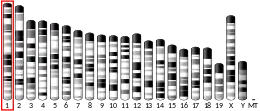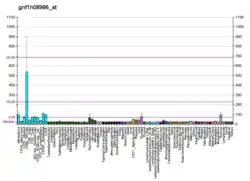| UHMK1 | |||||||||||||||||||||||||||||||||||||||||||||||||||
|---|---|---|---|---|---|---|---|---|---|---|---|---|---|---|---|---|---|---|---|---|---|---|---|---|---|---|---|---|---|---|---|---|---|---|---|---|---|---|---|---|---|---|---|---|---|---|---|---|---|---|---|
| Identifiers | |||||||||||||||||||||||||||||||||||||||||||||||||||
| Aliases | UHMK1, KIS, KIST, P-CIP2, U2AF homology motif (UHM) kinase 1, U2AF homology motif kinase 1 | ||||||||||||||||||||||||||||||||||||||||||||||||||
| External IDs | OMIM: 608849 MGI: 1341908 HomoloGene: 7801 GeneCards: UHMK1 | ||||||||||||||||||||||||||||||||||||||||||||||||||
| |||||||||||||||||||||||||||||||||||||||||||||||||||
| |||||||||||||||||||||||||||||||||||||||||||||||||||
| |||||||||||||||||||||||||||||||||||||||||||||||||||
| |||||||||||||||||||||||||||||||||||||||||||||||||||
| |||||||||||||||||||||||||||||||||||||||||||||||||||
| Wikidata | |||||||||||||||||||||||||||||||||||||||||||||||||||
| |||||||||||||||||||||||||||||||||||||||||||||||||||
U2AF homology motif (UHM) kinase 1, also known as UHMK1, is a protein which in humans is encoded by the UHMK1 gene.[5][6]
Function
UHMK1 is a kinase enzyme which phosphorylates the protein stathmin and has an RNA recognition motif of unknown function.[7]
Clinical significance
UHMK1 is highly expressed in the brain and has been genetically implicated in schizophrenia in two genetic studies.[8][9] Mice with the gene encoding stathmin knocked out, so that they do not express this protein in the brain, show abnormal fear responses. This effect could be developed as an animal model for schizophrenia.[10] UHMK1 also phosphorylates the CNS proteins myelin basic protein (MBP) and synapsin I so that genetic abnormalities in UHMK1 could contribute to the genetic cause of schizophrenia through several different brain pathways. UHMK1 is also implicated in the progression of many cancers such as gastric,[11] liver,[12] colorectal,[13] cervical[14] and leukemia.[15]
References
- 1 2 3 GRCh38: Ensembl release 89: ENSG00000152332 - Ensembl, May 2017
- 1 2 3 GRCm38: Ensembl release 89: ENSMUSG00000026667 - Ensembl, May 2017
- ↑ "Human PubMed Reference:". National Center for Biotechnology Information, U.S. National Library of Medicine.
- ↑ "Mouse PubMed Reference:". National Center for Biotechnology Information, U.S. National Library of Medicine.
- ↑ "Entrez Gene: UHMK1 U2AF homology motif (UHM) kinase 1".
- ↑ Boehm M, Yoshimoto T, Crook MF, Nallamshetty S, True A, Nabel GJ, Nabel EG (July 2002). "A growth factor-dependent nuclear kinase phosphorylates p27Kip1 and regulates cell cycle progression". The EMBO Journal. 21 (13): 3390–401. doi:10.1093/emboj/cdf343. PMC 126092. PMID 12093740.
- ↑ Bièche I, Manceau V, Curmi PA, Laurendeau I, Lachkar S, Leroy K, Vidaud D, Sobel A, Maucuer A (May 2003). "Quantitative RT-PCR reveals a ubiquitous but preferentially neural expression of the KIS gene in rat and human". Brain Research. Molecular Brain Research. 114 (1): 55–64. doi:10.1016/S0169-328X(03)00132-3. PMID 12782393.
- ↑ Puri V, McQuillin A, Choudhury K, et al. (2007). "Fine mapping by genetic association implicates the chromosome 1q23.3 gene UHMK1, encoding a serine/threonine protein kinase, as a novel schizophrenia susceptibility gene". Biol. Psychiatry. 61 (7): 873–9. doi:10.1016/j.biopsych.2006.06.014. PMID 16978587. S2CID 26013777.
- ↑ Puri V, McQuillin A, Datta S, Choudhury K, Pimm J, Thirumalai S, Krasucki R, Lawrence J, Quested D, Bass N, Crombie C, Fraser G, Walker N, Moorey H, Ray MK, Sule A, Curtis D, St Clair D, Gurling H (October 2008). "Confirmation of the genetic association between the U2AF homology motif (UHM) kinase 1 (UHMK1) gene and schizophrenia on chromosome 1q23.3". European Journal of Human Genetics. 16 (10): 1275–82. doi:10.1038/ejhg.2008.76. PMID 18414510.
- ↑ Shumyatsky GP, Malleret G, Shin RM, Takizawa S, Tully K, Tsvetkov E, Zakharenko SS, Joseph J, Vronskaya S, Yin D, Schubart UK, Kandel ER, Bolshakov VY (November 2005). "stathmin, a gene enriched in the amygdala, controls both learned and innate fear". Cell. 123 (4): 697–709. doi:10.1016/j.cell.2005.08.038. PMID 16286011. S2CID 18332686.
- ↑ Feng, Xing; Ma, Dong; Zhao, Jiabao; Song, Yongxi; Zhu, Yuekun; Zhou, Qingxin; Ma, Fei; Liu, Xing; Zhong, Mengya; Liu, Yu; Xiong, Yubo (2020-03-02). "UHMK1 promotes gastric cancer progression through reprogramming nucleotide metabolism". The EMBO Journal. 39 (5): e102541. doi:10.15252/embj.2019102541. ISSN 1460-2075. PMC 7049804. PMID 31975428.
- ↑ Wei, Teng; Weiler, Sofia Maria Elisabeth; Tóth, Marcell; Sticht, Carsten; Lutz, Teresa; Thomann, Stefan; De La Torre, Carolina; Straub, Beate; Merker, Sabine; Ruppert, Thomas; Marquardt, Jens (July 2019). "YAP-dependent induction of UHMK1 supports nuclear enrichment of the oncogene MYBL2 and proliferation in liver cancer cells". Oncogene. 38 (27): 5541–5550. doi:10.1038/s41388-019-0801-y. ISSN 1476-5594. PMID 30936457. S2CID 89616899.
- ↑ Xu, Xiang-Hao; Song, Wen; Li, Jun-Hua; Huang, Ze-Qi; Liu, Ya-Fang; Bao, Qiang; Shen, Zhi-Wen (2021). "Long Non-coding RNA EBLN3P Regulates UHMK1 Expression by Sponging miR-323a-3p and Promotes Colorectal Cancer Progression". Frontiers in Medicine. 8: 651600. doi:10.3389/fmed.2021.651600. ISSN 2296-858X. PMC 8180563. PMID 34109193.
- ↑ Mousavi, Seyedeh Zahra; Poortahmasebi, Vahdat; Mokhtari-Azad, Talat; Shahmahmoodi, Shohreh; Farahmand, Mohammad; Farzanehpour, Mahdieh; Jalilvand, Somayeh (December 2020). "The dysregulation of microarray gene expression in cervical cancer is associated with overexpression of a unique messenger RNA signature". Iranian Journal of Microbiology. 12 (6): 629–635. doi:10.18502/ijm.v12i6.5039. ISSN 2008-3289. PMC 7884268. PMID 33613919.
- ↑ Barbutti, Isabella; Machado-Neto, João Agostinho; Arfelli, Vanessa Cristina; de Melo Campos, Paula; Traina, Fabiola; Saad, Sara Teresinha Olalla; Archangelo, Leticia Fröhlich (March 2018). "The U2AF homology motif kinase 1 (UHMK1) is upregulated upon hematopoietic cell differentiation". Biochimica et Biophysica Acta (BBA) - Molecular Basis of Disease. 1864 (3): 959–966. doi:10.1016/j.bbadis.2018.01.004. ISSN 0925-4439. PMID 29307747.
Further reading
- Crook MF, Olive M, Xue HH, et al. (2008). "GA-binding protein regulates KIS gene expression, cell migration, and cell cycle progression". FASEB J. 22 (1): 225–35. doi:10.1096/fj.07-8573com. PMID 17726090. S2CID 20012567.
- Gregory SG, Barlow KF, McLay KE, et al. (2006). "The DNA sequence and biological annotation of human chromosome 1". Nature. 441 (7091): 315–21. Bibcode:2006Natur.441..315G. doi:10.1038/nature04727. PMID 16710414.
- Gerhard DS, Wagner L, Feingold EA, et al. (2004). "The Status, Quality, and Expansion of the NIH Full-Length cDNA Project: The Mammalian Gene Collection (MGC)". Genome Res. 14 (10B): 2121–7. doi:10.1101/gr.2596504. PMC 528928. PMID 15489334.
- Bièche I, Manceau V, Curmi PA, et al. (2003). "Quantitative RT-PCR reveals a ubiquitous but preferentially neural expression of the KIS gene in rat and human". Brain Res. Mol. Brain Res. 114 (1): 55–64. doi:10.1016/S0169-328X(03)00132-3. PMID 12782393.
- Strausberg RL, Feingold EA, Grouse LH, et al. (2003). "Generation and initial analysis of more than 15,000 full-length human and mouse cDNA sequences". Proc. Natl. Acad. Sci. U.S.A. 99 (26): 16899–903. Bibcode:2002PNAS...9916899M. doi:10.1073/pnas.242603899. PMC 139241. PMID 12477932.
- Boehm M, Yoshimoto T, Crook MF, et al. (2002). "A growth factor-dependent nuclear kinase phosphorylates p27Kip1 and regulates cell cycle progression". EMBO J. 21 (13): 3390–401. doi:10.1093/emboj/cdf343. PMC 126092. PMID 12093740.
- Caldwell BD, Darlington DN, Penzes P, et al. (2000). "The novel kinase peptidylglycine alpha-amidating monooxygenase cytosolic interactor protein 2 interacts with the cytosolic routing determinants of the peptide processing enzyme peptidylglycine alpha-amidating monooxygenase". J. Biol. Chem. 274 (49): 34646–56. doi:10.1074/jbc.274.49.34646. PMID 10574929.
- Maucuer A, Camonis JH, Sobel A (1995). "Stathmin interaction with a putative kinase and coiled-coil-forming protein domains". Proc. Natl. Acad. Sci. U.S.A. 92 (8): 3100–4. Bibcode:1995PNAS...92.3100M. doi:10.1073/pnas.92.8.3100. PMC 42112. PMID 7724523.




